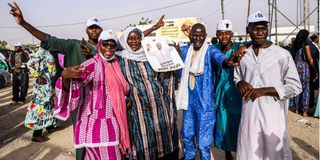Mauritanians vote as President Ghazouani seeks re-election

Supporters of Otouma Soumare, a neurosurgeon and Mauritanian presidential candidate attend his final campaign rally in Nouakchott, Mauritania on June 27, 2024.PHOTO | REUTERS
Mauritanians voted on Saturday in a presidential election that incumbent Mohamed Ould Ghazouani is widely expected to win, aiming to boost investment in the West African country as it prepares to start producing natural gas.
Ghazouani, 67, a former top soldier, has promised investor-friendly policies to spur commodities boom in the country of 5 million people, many of whom live in poverty despite its fossil fuel and minerals wealth.
Polls opened at 0700 GMT. Voting is expected to end at 1900 GMT, and provisional results are expected from Sunday.
Elected for a first term in 2019, Ghazouani is facing a field of six opponents, among them anti-slavery activist Biram Dah Abeid, who came second in 2019 with over 18 percent of the vote.
Other challengers include lawyer Id Mohameden M'Bareck, economist Mohamed Lemine El Mourtaji El Wafi, and Hamadi Sidi El Mokhtar of the Islamist Tewassoul party.
Casting his ballot soon after polls opened in the capital Nouakchott, 39-year-old geographer Mohamed Cheikh Hadrami said he had voted for a candidate "who will be able to reconcile Mauritanians". He declined to say who he had voted for.
Some 2 million people were registered to vote, with major election issues including fighting corruption and creating jobs for the young.
If re-elected, Ghazouani has promised a natural gas-fired power plant from the Greater Tortue Ahmeyin (GTA) offshore gas project, which is on track to start production by the end of the year. He also pledged to invest in renewable energy and expand gold, uranium, and iron-ore mining.
Ghazouani has presided over a period of relative stability since 2019, as Mauritania's Sahel neighbours, including Mali, struggle with Islamist insurgencies that have led to military coups.
Mauritania has not recorded a militant attack on its soil in recent years and Ghazouani, who currently chairs the African Union, has promised to manage Islamist threats.
Prominent activist Abeid is challenging Ghazouani on his human rights record and the marginalisation of Mauritania's Black African population, while El Mokhtar has a following among conservative and religious voters.
"President Ghazouani will likely win the vote in the first round," said Mucahid Durmaz, senior West Africa analyst at risk intelligence company Verisk Maplecroft.
"The president's re-election bid has been boosted by the ruling party's landslide victory in legislative elections last year," he added.
If no candidate receives more than 50 percent of the vote, the election will go to a second round.
One opposition supporter in Nouakchott, who spoke on condition of anonymity, thought Ghazouani might struggle to win outright "if the votes are conducted transparently".
In the last election, some opposition candidates questioned the credibility of the vote, sparking some small-scale protests.




